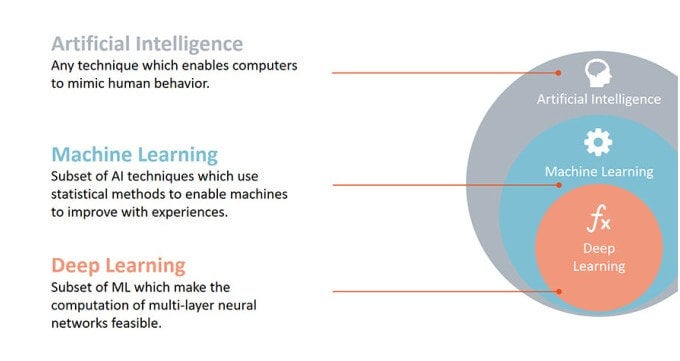What is Artificial Intelligence (AI)?
The emergence of artificial intelligence (AI) has played a key part in ushering in the Fourth Industrial Revolution. According to the World Economic Forum, “it is disrupting almost every industry in every country.”
“We stand on the brink of a technological revolution that will fundamentally alter the way we live, work, and relate to one another. In its scale, scope, and complexity, the transformation will be unlike anything humankind has experienced before.” – Klaus Schwab, Founder and Executive Chairman, World Economic Forum Geneva
Artificial intelligence is a conglomeration of concepts and technologies that means different things to different people – self-driving cars, robots that impersonate humans, machine learning, and more – and its applications are everywhere you look. The typical definition of AI looks something like this:

Source: KDNuggets
Jeremy Achin, CEO of DataRobot, defines AI more simply:
“An AI is a computer system that is able to perform tasks that ordinarily require human intelligence. These artificial intelligence systems are powered by machine learning. Many of them are powered by machine learning, some of them are powered by specifically deep learning, some of them are powered by very boring things like just rules.”
For a more in-depth explanation, watch Jeremy’s keynote on the subject from the Japan AI Experience.
Why is Artificial Intelligence Important?
Artificial intelligence systems are critical for companies that wish to extract value from data by automating and optimizing processes or producing actionable insights. Artificial intelligence systems powered by machine learning enable companies to leverage large amounts of available data to uncover insights and patterns that would be impossible for any one person to identify, enabling them to deliver more targeted, personalized communications, predict critical care events, identify likely fraudulent transactions, and more.
Harvard Business Review gives key insight into how important AI is in today’s economic environment:
“The effects of AI will be magnified in the coming decade, as manufacturing, retailing, transportation, finance, healthcare, law, advertising, insurance, entertainment, education, and virtually every other industry transform their core processes and business models to take advantage of machine learning.”
Companies that fail to adopt AI and machine learning technologies are fated to be left behind:
- Global spending on AI will grow 50% compounded annually and will reach $57.6 billion by 2021.
- Industries like retail, marketing, healthcare, fintech, insurance, and more will all stand to benefit from AI and machine learning.
- Companies driven by insights from data will take $1.2 trillion a year from non-insight driven companies by 2020.
- 83% of early adopters are already gaining value from AI and machine learning initiatives.
- The net gain in jobs resulting from AI adoption will be over 5 million.
Artificial Intelligence + DataRobot
DataRobot was founded on the belief that emerging AI and machine learning technologies should be available to all enterprises, regardless of size and resources. That’s why we invented automated machine learning, which allows users of all skill levels to easily and rapidly build and deploy machine learning models.
DataRobot believes in the democratization of AI, and for that reason, we developed a platform to enable business users across organizations to gain actionable, practical insights that result in tangible business value. DataRobot makes the power of AI accessible to users throughout your business, helping your organization transform into an AI-driven enterprise.




